Hi Sweet Friends,
Well, it’s late January, so I’m guessing that more than a few of you have slipped on your New Year’s resolutions (me too!). First of all—no biggie. If the goals you made while ringing in 2014 are still important to you, keep moving toward them one step at a time. Turtle power! But if you haven’t pinpointed what you want to do to improve your health, you’re not alone. Many of my readers are overwhelmed.
I get this question almost daily, “There are so many healthy habits to choose from—which one should I tackle first?”
Translation: What will make the biggest difference in my health TODAY.
Of course, green juices and smoothies are my numero uno recommendation, but second is always… dumping dairy. That’s right, go dairy-free.
You’re gonna learn a lot about dairy in a minute, but here are a few of the main reasons I removed it from my diet. Dairy is high in saturated fat (which can lead to stroke and heart attacks), it’s highly inflammatory (the root cause of many chronic diseases), and the growth hormones in dairy (ex. IGF1) can stimulate malignant cell growth and proliferation (because I have cancer, that’s a big NO thanks!). I know from personal experience, and from thousands of emails, Facebook comments, and tweets, that saying adieu to dairy can totally transform your health. So even if you’re not keen on ditching your milkshakes and brie today, I invite you to learn a little more about this bovine beverage. Even lessening the amount of dairy you consume can make a difference in how you feel.
How Dairy Impact Your Health
(excerpted & updated from Crazy Sexy Diet and Crazy Sexy Kitchen)
A cow drinks cow’s milk when it’s a baby. A bunny drinks bunny’s milk when it’s a baby. Beyond a certain age, even they know that it’s freaky to suckle. And do you ever see them switch and swap? The only time milk is essential for good health is when we are babies, being breastfed by human mothers. Human breast milk is nature’s perfect formula for human babies. It’s rich in good fats like DHA for brain development, but it’s relatively low in protein. Cow’s milk contains more than three times as much protein as breast milk. That’s because baby cows need a lot more protein. They grow to between 1,500 and 2,000 pounds. Is that your desired weight? If so, hello reality TV!
While the protein in human milk is designed for human bodies, much of the protein in cow’s milk is difficult for humans to digest.
In addition, the over-consumption of this protein can lead to serious health conditions. Dr. T. Colin Campbell, professor emeritus of nutritional biochemistry at Cornell University, found that the protein that consistently creates and promotes cancer is casein, which makes up about 87 percent of the protein in cow’s milk. According to Dr. Campbell, a diet that contains more than 10 percent protein (that’s about 50 grams of protein if you’re consuming 2,000 calories per day) can lead to the little “c.” Guess what? Americans eat way more than that (an average of 17 percent total protein, of which 12 to 13 percent is animal-based!).
Forget scary, life-threatening diseases, let’s talk about simpler pickles.
Ever pass a kidney stone? If you have, then you know that it’s incredibly painful—sorta feels like shooting an elephant through your pee hole! How about Crohn’s disease, a veritable inflammation blow-out sale? Both of these not-so-happy afflictions have been linked to dairy consumption. Allergies, eczema, asthma, arthritis, inflammation, and zits can all be linked to dairy. What about skim milk or nonfat milk? They’re just as bad. For me, cheese was the hardest thing to give up, but once I did, my weird rashes and forehead bumps disappeared. I also started to breathe easier—a pretty important change for a gal with cancer in her lungs. Perhaps this is too much information, but my poop changed, too. It came out regularly!
How about tummy pain, gas and bloating? Well, there may be a good reason for your belly’s aching. According to the American Academy of Family Physicians, around 75 percent of the world’s adults can’t digest milk (they’re lactose-intolerant). Among some populations, such as Native Americans and Asians, the figure is over 90 percent. Beyond childhood, most people stop producing the enzyme lactase, which is needed to digest lactose (the sugar in milk). Yeah, your body thinks you should wean, too. I’ve never met someone who didn’t feel better once they removed dairy from their diet. Sorry folks, but all good things come to an end.
Beyond Pasteurized Cow’s Milk
After reading your comments on this blog, I realized that a lot of my readers are curious (and passionate) about raw cow’s milk, goat’s milk and sheep’s milk. I checked in with my resident RD, Jennifer Reilly, to get the scoop on the other animal-based milk options on the block. Here’s what she had to say:
Raw Cow’s Milk: Many foodies and natural health advocates have been singing the praises of raw cow’s milk compared to pasteurized cow’s milk for some time. They claim that raw milk has more digestive enzymes (including lactase which breaks down the milk sugar lactose), more probiotics, more immune-boosters, and a richer supply of vitamins and minerals, which are otherwise killed during the heating process of pasteurization. Very little scientific research has been done to confirm or dispute these claims, although there are plenty of raw milk advocates who are positive that their allergies diminished, asthma improved, and lactose intolerance disappeared once they switched to raw cow’s milk.
Raw cow’s milk may be a step up from pasteurized cow’s milk as the raw version is often from cows only fed organic grass and not treated with antibiotics or artificial hormones. But, keep in mind that without pasteurization, raw cow’s milk is still rich in inflammatory and allergy-potential casein (milk protein), contains potentially cancer-causing Insulin-like Growth Factor 1 (IGF-1) (and its consumption also causes an additional production of IGF-1 in the human body), natural hormones, and without pasteurization, raw cow’s milk contains human pathogens which are of particular concern to food scientists, including Salmonella, E. Coli, and Listeria (see abstract here). These pathogens are especially risky for folks with compromised immune systems.
Goat & Sheep Milk: People are also turning toward milk from goats and sheep as alternatives to cow’s milk, and here’s why. Both goat and sheep milks have less lactose, so digestion is easier for humans compared to cow’s milk. Goat milk is closest in structure to human milk and is slightly alkaline, whereas cow’s milk is slightly acidic. Both sheep and goat milk contain a greater percentage of medium-chain fatty acids compared to cow’s milk which makes them naturally homogenized and easier to digest aside from the lower lactose content. To me, goat and sheep milk seem like a better option. But remember, you’re still getting casein and growth factors which may have a negative effect on human health. So if you’re consuming any kind of dairy, choose the best sources and do so in moderation.
Thanks, Jen!
Now, onto one of the biggest questions about living dairy-free…
But, where will I get calcium?
This is probably the most frequently asked question when talking about going dairy-free. Good news! Nature’s best calcium sources are dark leafy greens such as kale, collards, mustard greens, and turnip greens. The calcium in these foods is absorbed at double the rate of dairy calcium. About 30 percent of dairy calcium is absorbed whereas about 60 percent of calcium from dark leafy greens is absorbed. Other rich plant sources of calcium include beans, almonds, figs, and fortified nondairy milks such as unsweetened almond milk, oat milk, hemp milk, and rice milk.
When it comes to bone health, calcium isn’t the only factor.
Overall diet and activity levels determine bone health and even calcium needs. Countries with the highest calcium intake have the most osteoporosis, so there’s obviously more to the bone-health story than calcium alone.
Here’s another helpful factoid, vitamin D—which is necessary for calcium absorption and is best obtained from 20 minutes of sunshine 3 times a week during summer months and fortified, nondairy foods or supplements during winter months—is now being considered the most important nutrient in bone health. Bottom line: A diet rich in plant foods easily meets calcium needs. Check out this handy infographic for even more info on your calcium needs and plant-based sources.
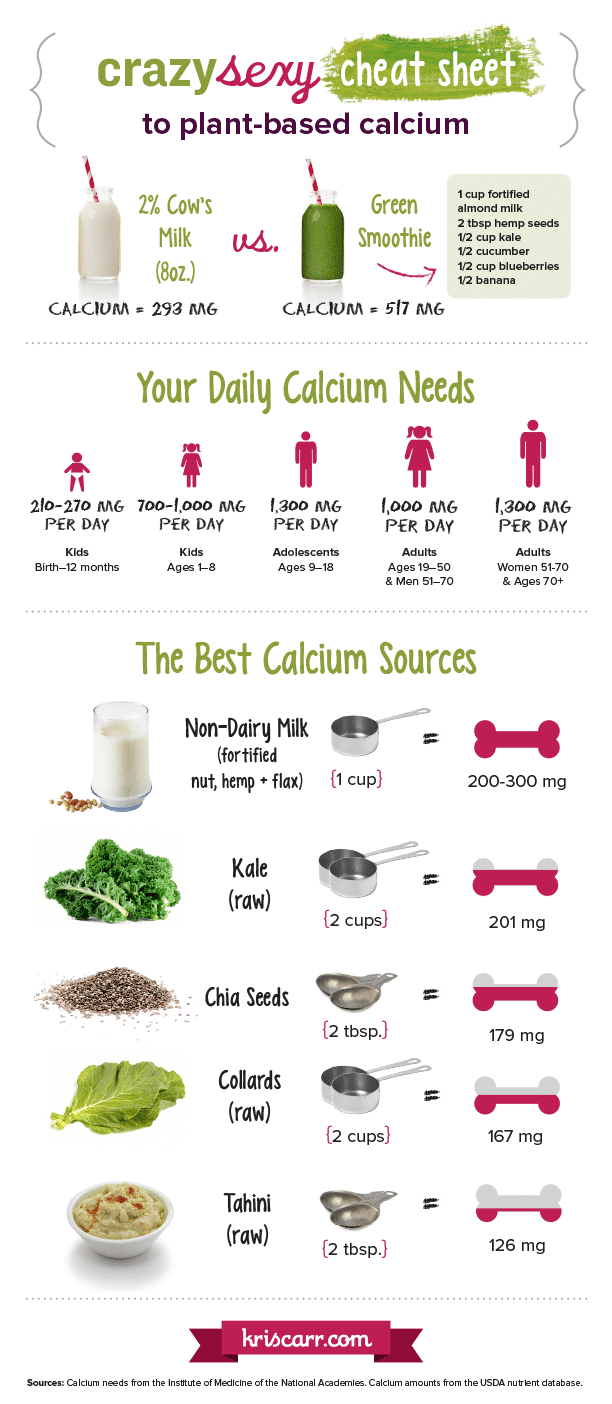
Dairy Free Alternatives
Going dairy-free doesn’t mean deprivation, it just means trying new things! Nowadays there are so many options that are just as good as the “real” deal. To learn about my favorite store-bought dairy alternatives, take a peek at my pantry and fridge. But when you get down to it, the real magic happens in the kitchen. Did you know that you can make your own moo-less cheeses, creams, milks and spreads at home? Plant-based, whole food recipes are easy and way healthier than the store bought stuff. And since I want you to taste this dairy-free goodness pronto, I’ve included some of my go-to Crazy Sexy Kitchen recipes for your enjoyment!
Dairy Free Diet Recipes
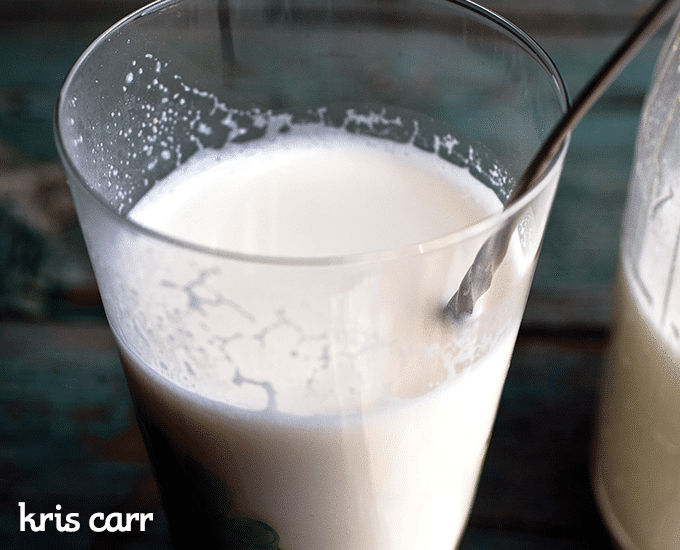
Basic Nut/Seed Milk (Crazy Sexy Kitchen)
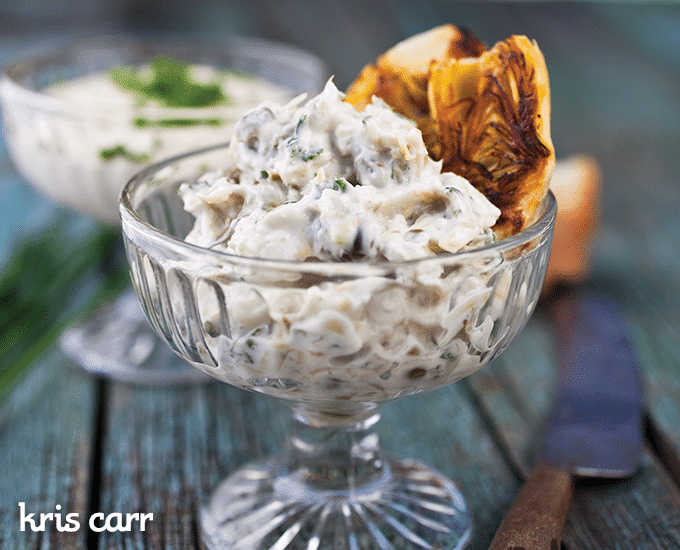
Artichoke Aioli (Crazy Sexy Kitchen)
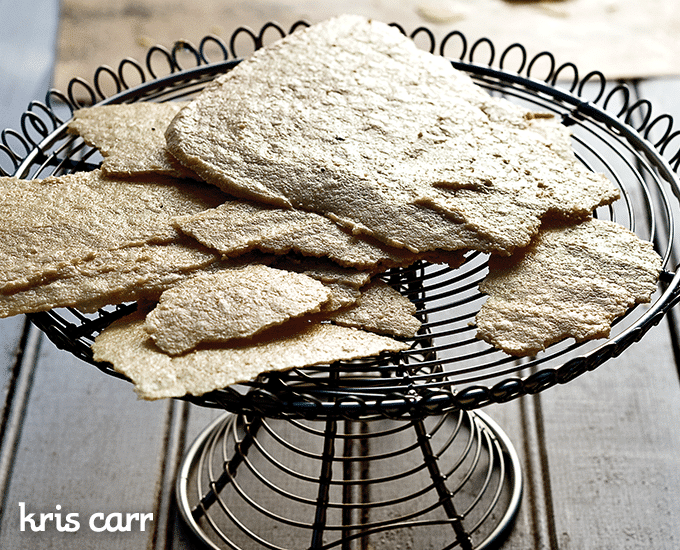
Truffled Parmesan (Crazy Sexy Kitchen)
Oooh, one last tip… Remember that most store bought alternatives are processed, so eat them in moderation or just use them as transition foods till your palate shifts. Also, when choosing these products, look for carrageenan-free, check out this comprehensive list.)
I hope this helps and as always, you don’t have to change everything at once. Slow and steady wins the race. But if you’re dealing with any inflammatory issues, this one recommendation may be the best place to start!
Now it’s your turn, have you seen a change in your overall health after removing dairy from your diet? What are your favorite dairy alternatives?
Peace & nut cheese,
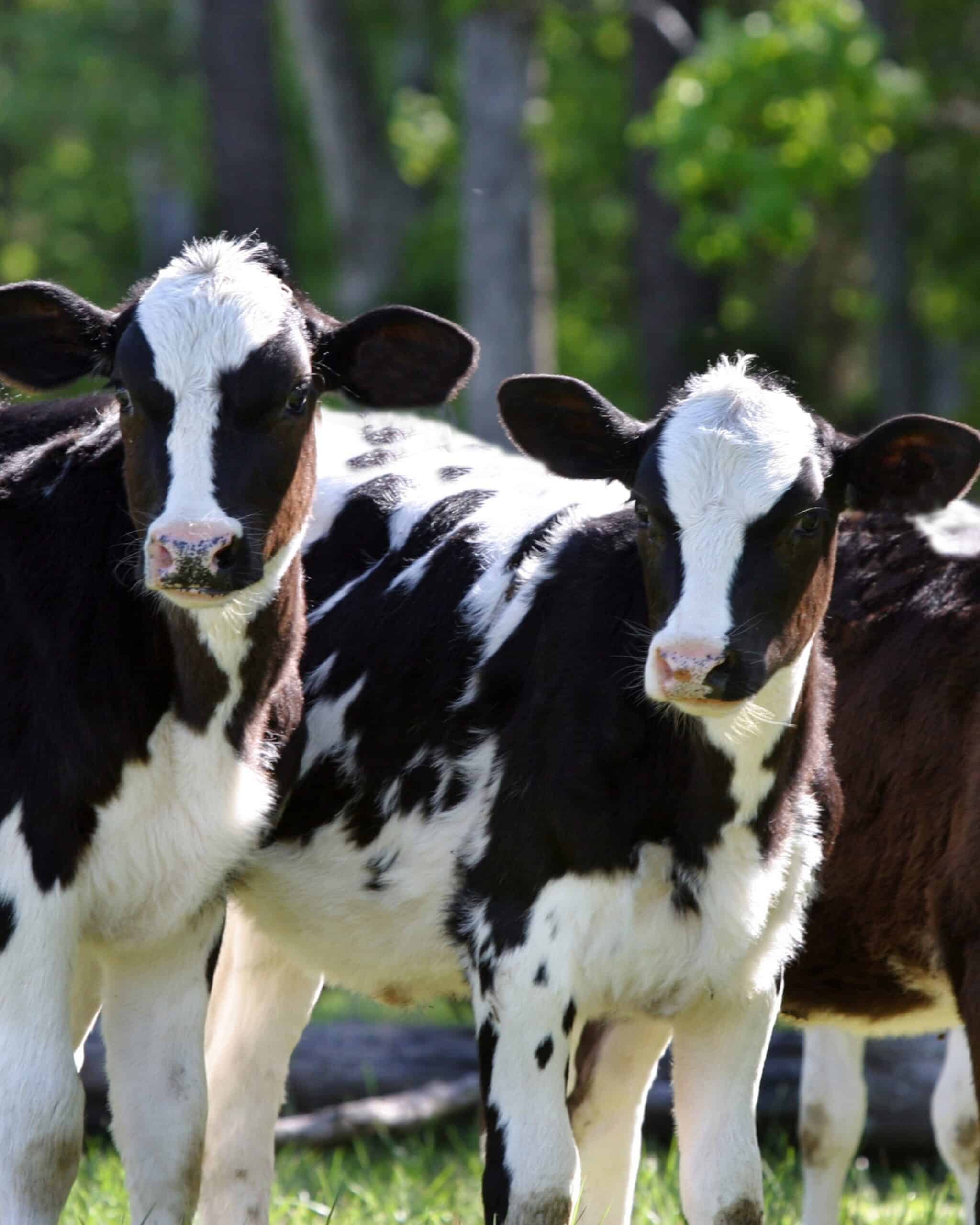


I love the information! I didn’t realize how “bad” cows milk was for me until I developed an allergy to it sophomore year of college. While it’s not going to kill you to consume it does cause inflammation as well as other bowel issue. My husband develops minor psoriasis when he drinks milk, but swears its not an issue. I challenge everyone to go through a 21 day milk cleanse to see how they feel.
My naturopath in Perth sent me this great dairy free resource
http://natmed.com.au/dairy-free/
Thank you. I appreciate your dairy free information and recipes, but I have to ask you the same question I have for so many people that post gluten free recipes. Why do you not post the nutrition information for the recipes?
I stopped reading that rest of your article when I read “Saturated Fat leads to…….”
I got on a High Fat Low Carb diet on 8-9-15, I was 245lbs @ 5’11” that’s 75 lbs overweight according to B.M.I. chart. I had high blood pressure, high Triglycerides @ 209. Now I’m 188 lbs. With regularly blood pressure & my Triglycerides down to 96! Off the Meds.
I feel great eating Saturated Fats! Get with the times Jethro. All books on HFLC , Ketogenic & Paleo diets explain the False Theory on Saturated Fats are bad.
“How dairy impacts our health” is certainly a great subject of awareness. Leaving most known causes that can lead to physical ailments, one can also be dairy product intolerant, one or other ways (seen some often fetching life-threatening diseases from). Fantastic write-up. Worth reading!
Really nice post that brings home solutions to finding better sources for calcium and healthy eating. GREAT info graphics as well. I think people just don’t realize how hard dairy is on the body. Thanks for the time you spent creating this great resource.
Thanks for this, I hate the ‘where do you get calcium from’ question! I also react to goats milk so it must be the casein for me!! I just don’t think us humans are made to digest cow’s milk!
Definitely Non-Diary milk is always better than Diary milk in all aspects. Thanks a lot for sharing. I love drinking nut milk and my favorite is Almond milk. Here is some of its benefits I would love to share.
http://www.body-in-balance.org/blog/nutrition/health-benefits-almond-milk/
I already loved Kris Carr. And the fact that she refers to cancer as the little “c” (not giving it any more power than it should have), just clinched it.
Thanks, Kris, for helping us all to work toward great health.
These comments must be from the very few with intolerance to dairy. For the majority, it is a SUPERFOOD
Will you be posting more? I would love to see more dairy free living posts!
Sadly, I don’t think anyone in my family would go for this, so I would not be able to stick to it myself to even be able to try it out. I really don’t think I could be “vegan”, that’s for sure. I have cut back on dairy, though. I still love ice cream & cheese, but I eat way less of it than I used to.
What is your thoughts on bovine colostrum as a supplement? Of course from grass fed, hormone and antibiotic free bovines, and from the first 6 hours after giving birth. It’s suppose to be more bio-available from the first 6 hours, up to 86%.
Wait u beauty girl !
visit my catalog !!!
I am big fan, Kris, of your focus on plant-based nutrition. So, I wish this article didn’t paint with such a broad brush. To be sure, for those who are sensitive to dairy proteins, their health will be vastly improved by eliminating dairy. But for those who tolerate dairy, organic and grass-fed products can be a very nutrient-dense addition to the diet.
The science cited in this article is not strong. Saturated fat does not cause heart attack and stroke. There has been a whole spate of research recently showing this isn’t as simple as we used to think. Saturated fat is not the villain we once thought (and in fact the polyunsaturated vegetable oils we were told to use instead of saturated fats are actually more problematic). The article also states that dairy is highly-inflammatory. Well, if you’re sensitive to milk proteins, yes, if not, no. Dr. T. Colin Campbell’s ideas about casein and cancer are also incomplete. What Campbell missed, is that whey, another protein found in dairy, has anti-cancer effects that cancel out the cancer-promoting effects of casein. (Chalk one up for consuming whole foods.)
We often want our dietary prescriptions to be simple, but ideal diet really varies from person to person, and the truth about what leads to health isn’t usually as black and white as much the dietary advice out there makes it out to be. The flaw of this article is its simplistic treatment of a nuanced and complex subject. It makes good blog copy, but incomplete health advice.
Here’s my bottom line: If you feel better without dairy in your diet, great! It is probably a good idea to try eliminating it to see what effect that has. But if it doesn’t give you trouble (and you are not ethically opposed to animal products), why not seek out sources of high-quality dairy and enjoy in the context of a veg-rich diet.
I am doing pure organic non GMO whey protein shake from new zealand only 1% lactose..18 amino acids..vits &minerals and more..even tho I am dairy free I can do this..is whey considered a good form of dairy..or is it a matter of time for ill effects?
Hi Kris,
I would like to know if you have looked into Suzanne Somers Organic pdts. I have switched over to her line and absolutely love it. I love her mascara, though its not waterproof. I would love for you to look into her pdts. and add her to your list of recommendations. I love all that you are doing , I have IBS issues and having difficulty in losing weight. Very frustrating. I have hashimotos, under active thyroid among other things.
Thank you,
Cathy
Once again you’re heart and research are on the right track, but posting that the consumption of dairy “consistently creates” cancer is bold and under represented opinion. It is an obvious statement that dairy protein promotes cancer as it is clear that casein is the most potent cellular builder within our food chain. The inverse is also true. Cancer cells experience less growth while supported by vegetarian protein sources as they are less substantial in their ability to promote cellular growth. All cells will respond favorably to casein and will enjoy an exaggerated boost in growth from this potent protein source. This holds true for all the aforementioned ailments that you listed. Casein is not the causal agent, and I challenge you to site the studies that prove that it is.
Very interested in recipies
Can you cite sources to prove these claims, percentages, etc. please? Thx!
It is amazing how we all made it until 2014. What a bunch of politically correct CRAPOLEE